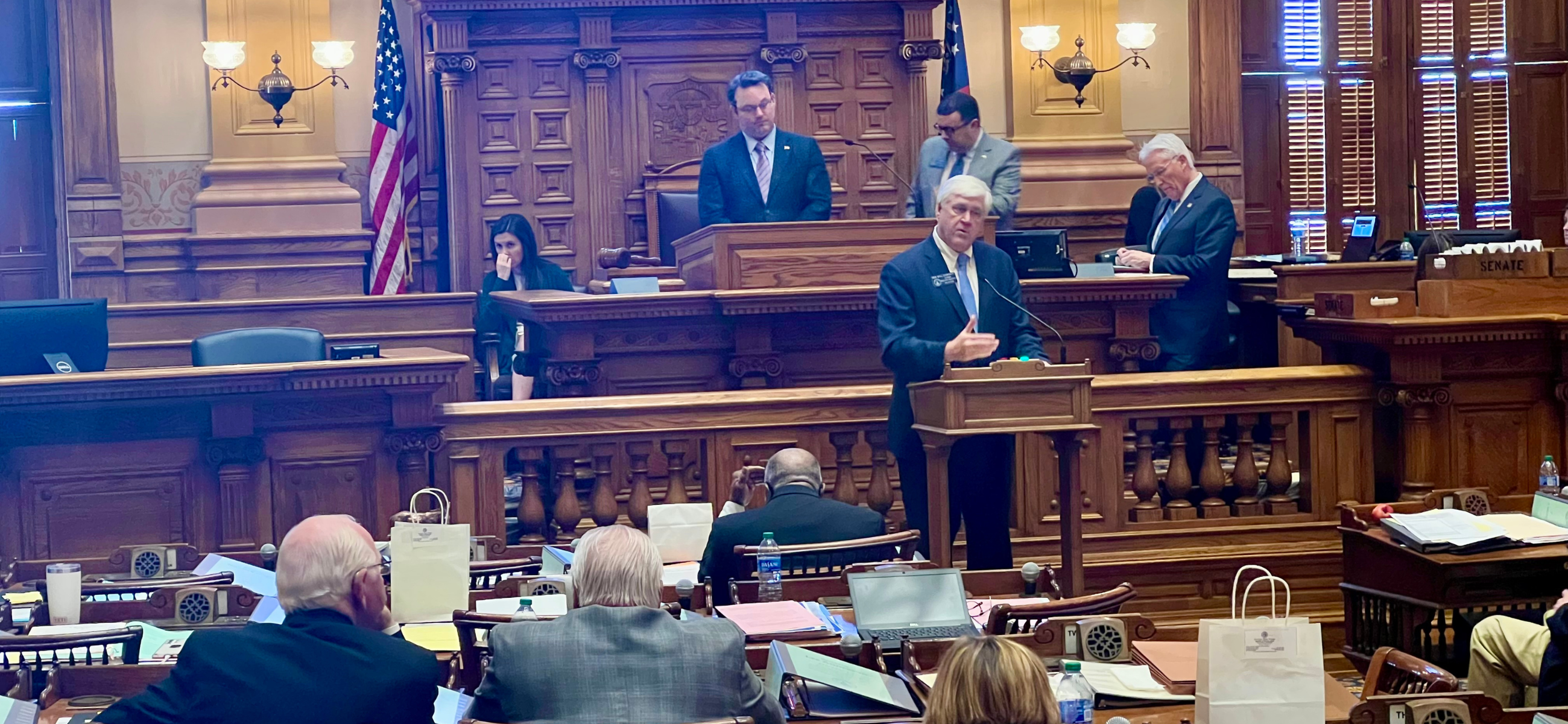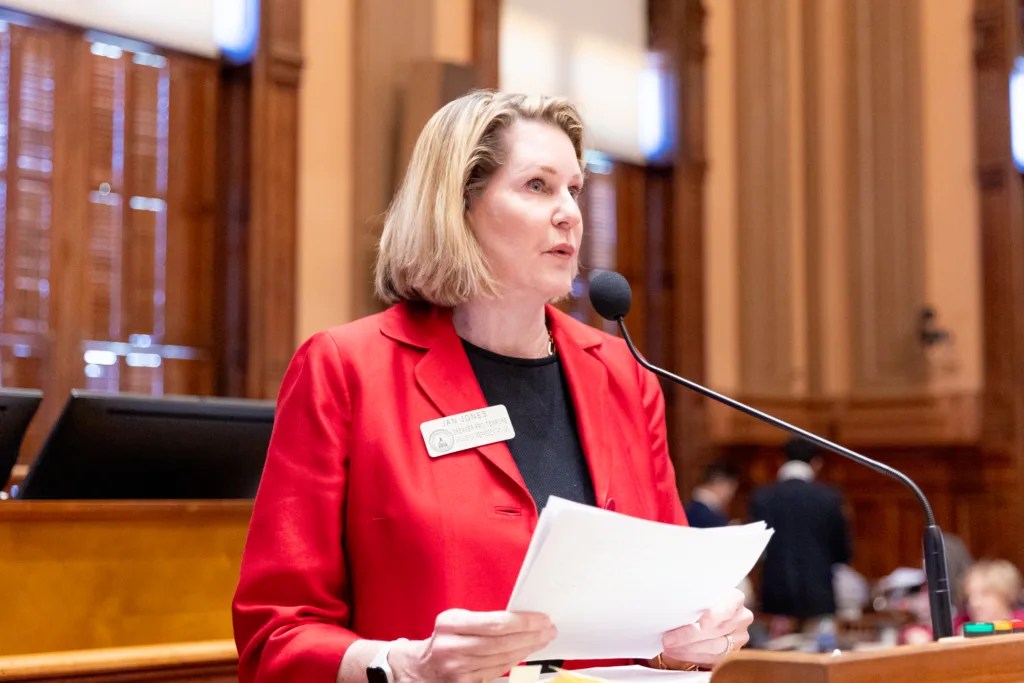Stay ahead of the curve as a political insider with deep policy analysis, daily briefings and policy-shaping tools.
Request a DemoMajor GOP legislative priorities clear hurdles to move forward

Sen. Bill Cowsert talks to his colleagues about the CON bill. March 14, 2024. (Credit: Tammy Joyner)
Two of the most substantial bills of the session — both high-priority do-overs for Republicans — cleared major hurdles this week after lengthy debates in each chamber.
The Senate passed legislation to make major changes to Georgia’s law governing medical services and where medical facilities are built. And the House approved a controversial private school voucher bill. Both measures had failed to get enough votes last session.
The Senate voted 43-11 to pass House Bill 1339, which changes the Certificate of Need process for approving new medical facilities, despite strident objections from Democrats who called for expanding Medicaid. The bill only includes a provision to create a study committee to look at expanding health care coverage.
HB 1339 passed the House last month after lawmakers created new provisions aimed at making it easier for providers to open hospitals in rural areas and build or expand obstetric and psychiatric facilities.
The amended bill would further expand the type of new health care centers that could be built, require a statutory review of the current State Health Planning and Development Code, and amend eligibility for the Rural Hospital Tax Credit. But both chambers still need to resolve changes added to the Senate version of the bill. Legislators must decide what regulations to do away with to allow for more medical care in Georgia, especially in rural communities.
Sen. Nikki Merritt, D- Grayson, said HB 1339 was “well-intended but it’s not the greater solution that’s needed.” Georgia’s uninsured rate is 13.7%, the third largest in the country, Merritt noted, and by 2026, the state’s uninsured rate for rural Georgians is expected to reach 25%. “A way to fix that without straining Georgia’s financial resources is to expand Medicaid. I like win-win solutions. We could do Medicaid and CON revisions. We can have both.”
Merritt and other Democrats’ appeals fell on deaf ears.
Sen. Bill Cowsert, R-Athens, called Thursday’s Certificate of Need debate “a step in the right direction about Medicaid expansion.”
“But you don’t always get everything you want in one bill,” Cowsert said. “And that’s disappointing to some, especially the more passionate you are about an issue. You want it now. It’s hard to be patient. But don’t kill even the baby steps by voting against this bill. If you vote against this bill, there’s no commission to consider Medicaid expansion. Don’t just pout and take the ball and go home because you don’t get full Medicaid expansion.”
Cowsert said the bill would help rural Georgians and metro Atlantans, especially those in South Fulton.
Meanwhile, Senate Bill 233, also known as the Georgia Promise Scholarship Act, would give families $6,500 per student per year to pay for private school tuition or home schooling expenses. To qualify, most students must attend public schools for at least one year in school districts performing in the bottom 25%. But 4-year-olds just starting kindergarten are also eligible.

The school voucher bill failed in the House last year when most Democrats and 16 rural Republican members voted no, expressing concerns about state funds being diverted from their local school districts and further weakening struggling schools. House leadership spent months working on developing new provisions in the bill to win them over, including a cap on the total amount to be spent on the program each year.
This time eight Republicans voted against the amended bill, which narrowly passed the House 91-82. It now moves back to the Senate, where it is likely to pass. Gov. Brian Kemp has already vowed to sign a school choice bill.
Here’s a look at other legislation moving through the General Assembly this week:
In the House
Senate Bill 469, sponsored by Sen. Jason Esteves, D-Atlanta, also known as the College Success 529 Expansion Act, would increase the maximum amount of contributions allowed to savings trust accounts for higher education expenses. Beginning in fiscal year 2025, which begins in July, the maximum contribution per student beneficiary is raised to $5,000 from $4,000, and the total amount allowed in a 529 savings plan account is changed from $235,000 to “a reasonable maximum amount as determined by the board based on current and anticipated education expenses.” It passed out of the House Higher Education committee and now awaits further action in the House.
The House unanimously passed Senate Bill 483, the Interstate Compact for Placement of Children, which provides for interstate agreements and policies governing the placement of children across states for adoption or temporary custody. Once 35 states join the compact, it will begin to operate; so far 16 states have enacted legislation to do so.
Rep. Joseph Gullett, R-Dallas, said the compact will make it easier and speed up the process to adopt children across state lines. Georgia would continue to have legal oversight over and responsibility for the care and safety of such children placed in other states. The bill passed 173-0 and now goes to the governor for consideration.
Senate Bill 421 would increase penalties for making false reports of shootings and bomb threats — known as swatting — at homes or places of worship. First offenses, now treated as misdemeanors, would become felonies, and the penalty for second offenses would increase from one to five years. A number of Georgia elected officials have experienced swatting calls in recent months, including Lt. Gov. Burt Jones, U.S. Rep Marjorie Taylor Greene and state Sen. Clint Dixon, R-Gwinnett, who sponsored the bill.
The House amended SB 421 to create a separate criminal offense for drive-by shootings. It passed in the House 162-2 and the amended bill now goes back to the Senate.
In the Senate
A House bill providing overdose remedies in Georgia’s public buildings now includes a ban on puberty blockers for transgender children. The Senate Health and Human Services Committee passed House Bill 1170, which includes the puberty-blocking language. The provision builds on legislation from last year that sought to limit gender-affirming care for transgender youth by adding puberty blockers to the list of medical interventions that would be denied to those under the age of 18. The decision blindsided Democrats and activists. The bill was introduced by Sen. Ben Watson, R-Savannah who chairs the committee.
The Senate Committee on Public Safety passed HB 1105 — also known as the The Georgia Criminal Alien Track and Report Act of 2024 — which requires local law enforcement agencies to cooperate with federal authorities to help enforce immigration laws. It also would provide verification procedures for the immigration status of inmates and procedures for cooperating with the federal government.
Two bills aimed at strengthening high-demand career pathway programs available in high schools, colleges and technical schools passed this week.
The Senate passed Senate Bill 497 which renames the High-demand Career Initiatives program the High Demand Apprenticeship Program, reflecting lawmakers’ desire to incentivize corporate apprentice sponsors and to expand work-based learning. The state will provide $10,000 per apprentice sponsors for contracts entered into before July 1 and $5,000 per apprentice for contracts entered into on or after July 1. The program gives priority to adult education programs employing apprentices who are 15- to 21-years-old.
The Senate also passed House Bill 982, which would task the State Workforce Development Board to develop and maintain a single High-Demand Career List most critical to the state’s current and future workforce needs that all technical schools, colleges, dual enrollment programs and CTAE programs in high schools will use to create programs and dole out funding. The governor is expected to sign it.
In other news, Fulton County Superior Court Judge Scott McAfee on Friday ruled that Fulton District Attorney Fani Willis could continue overseeing the prosecution of the Georgia election interference case against former president Donald Trump and his allies. McAfee, the judge in the Trump trial, also said in his 23-page ruling that Willis could stay only if Nathan Wade, the lead prosecutor Willis appointed to the case and had a romantic relationship with, leaves. Wade stepped down Friday afternoon.
Have questions? Contact Jill Jordan Sieder on X @journalistajill or at [email protected] and Tammy Joyner on X @lvjoyner or at [email protected].
And subscribe to State Affairs so you do not miss an update.
X @StateAffairsGA
Instagram@StateAffairsGA
Facebook @StateAffairsGA
LinkedIn @StateAffairs
Professionals still face licensing delays amid state’s transition to online system
The Gist Georgia’s professionals and business owners are still struggling to obtain professional licenses in a timely manner. As the Secretary of State’s Office rolls out its new Georgia Online Application Licensing System to expedite the process, the efficiency of this new process is being put to the test. What’s Happening Thursday morning at the …
Controversy over AP African American Studies class grows
Rashad Brown has been teaching Advanced Placement African American Studies at Atlanta’s Maynard Jackson High School for three years. He’ll continue to do so — even though the state’s top education official removed it from the list of state-funded course offerings for the upcoming school year. While Brown prepares to start teaching his class on …
Students, teachers, lawmakers blast decision to end AP African American history classes
ATLANTA — A coalition of lawmakers, civil rights leaders, clergy, educators and students Wednesday called on the state’s education czar to rescind his decision to drop an advanced placement African American studies class from the state’s curriculum for the upcoming school year. “This decision is the latest attack in a long-running GOP assault on Georgia’s …
Kamala Harris’ presidential bid reinvigorates Georgia Democrats
Georgia Democrats have gained new momentum heading into the November election, propelled by President Joe Biden’s decision to bow out of his reelection bid and hand the reins to Vice President Kamala Harris. The historic decision, announced Sunday, is expected to prove pivotal in the national and state political arenas and breathe new life and …



